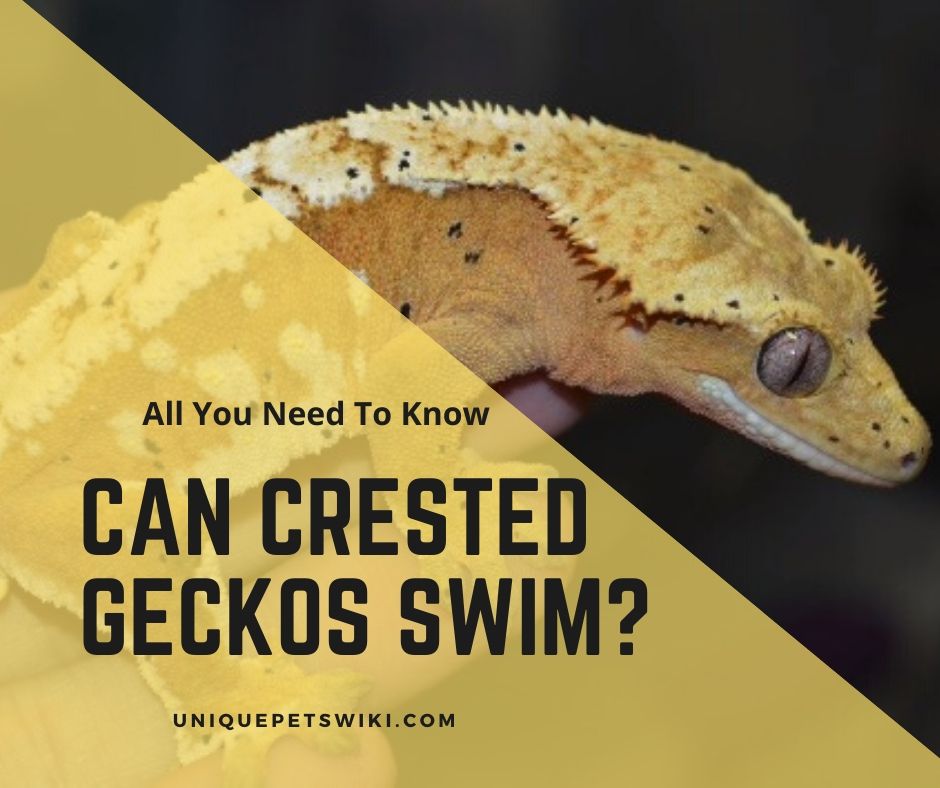Have you ever thought about “do crested geckos swim”? Crested gecko’s natural habitat is in areas with high humidity. Thus, it’s only natural for most of us to assume that they can swim. But, is it okay to make your crested gecko swim?
If you would like to understand how crested geckos can swim, and if it’s okay to bathe or force your crested gecko to swim, keep reading it.
Contents
Can Crested Geckos Swim?

To answer all your questions, firstly, we need to know: can crested gecko swim?
If a crested gecko finds itself in the water, it will try to maneuver through the water to find a safe spot. However, rather than saying “swim”, we can say that crested geckos walk on water.
Lizards can swim as a form of instinct. Crested gecko being a lizard, is not an exception. When a crested gecko is in danger, and near a pool of water, it’s natural for it to jump into the water to escape the predator.
Since crested geckos do not have gills, they have to hold their breath when under the water. Even so, it is infrequent for a crested gecko to dive into the water.
Instead, they try to stay afloat as they swim to the shore. And, when it’s impossible for them to stay afloat, they shortly hold their breath.
However, they can not hold their breath for long. So, if they don’t manage to get above the water quickly, they drown.
Thus, crested gecko’s ability is never a natural way of doing things, but a form of escaping death or danger.
How Do Crested Geckos Swim?

When crested geckos swim, it is never their intention. Thus, they do it as if they were walking on the land. It is because their main plan when they find themselves in water is to survive.
They use their tail to propel, and luckily for them, they have a hydrophobic skin that resists the water, helping them stay afloat.
However, if you see a crested gecko swimming, you would probably say they are excellent swimmers. It is because they can do it so well, but unfortunately, they only do it to save themselves.
Probably if only they knew how good they were at it, they would win a prize. Thus, we can only say that crested geckos are instinctive swimmers.
Can I Force My Crested Gecko to Swim?
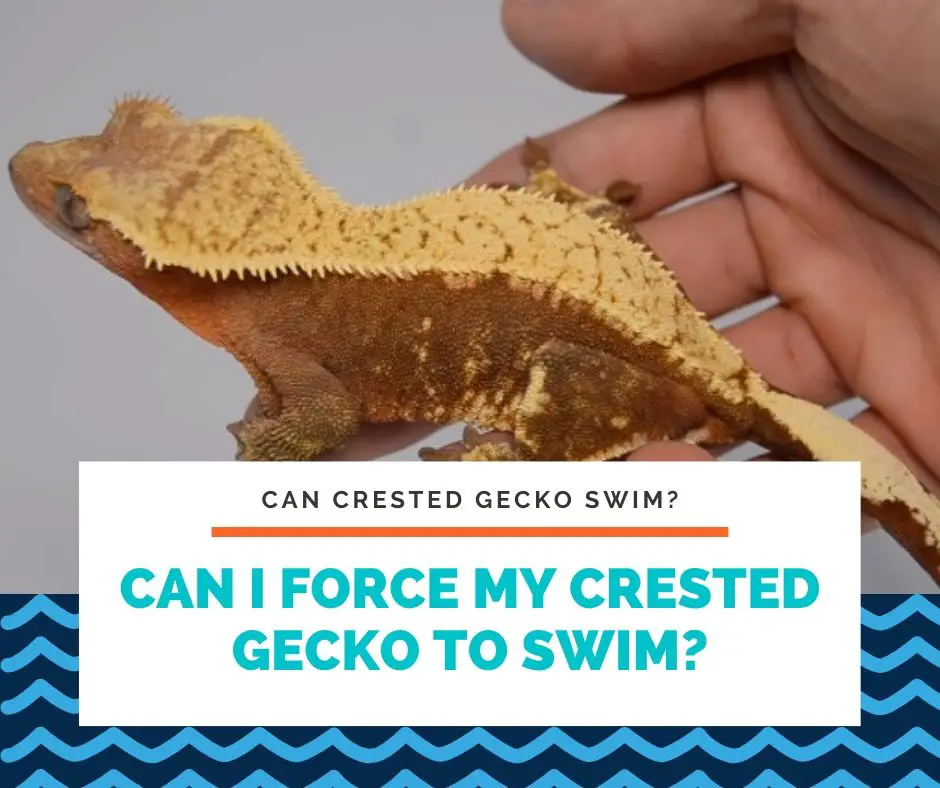
It is worth noting that crested geckos are not an aquatic reptile. Thus, it is wrong for you to force them to swim.
Crested geckos hate to swim. Swimming causes them stress, and it is usually a bad experience for them.
When you force your crested gecko to swim, it might lead to:
- Your gecko sees you as a threat. If you want to bond with your crested gecko, forcing it to swim will only cause fear.
- Death. In some instances, crested geckos drown in the water, causing them to die. Thus, in trying to force your crested gecko to swim, you might kill it.
- Stress. Anything that does not come naturally is a reason enough to cause stress. Thus, forcing your crested gecko to perform a task that scares can only cause stress.
For these valid reasons, it is wrong and unethical for you to force your crested gecko to swim. Rather than doing it right, you will only be causing stress to your crested gecko.
Can You Teach Your Crested Gecko To Swim?

Like we said before, crested geckos are not aquatic reptiles. Instead, they are instinctual swimmers, and thus, they don’t need you to teach them to do what they can do.
New to crested gecko? Check out the crested gecko care sheet now! We had listed out all the things you need to know about crested gecko as pets. Check it now!
Therefore, it is unreasonable for you to think that you were teaching them to swim. Trying to teach a crested gecko to swim is the same as forcing it.
Rather than teaching your crested gecko an entertaining activity, it would be tremendous stress on them.
Besides, why would you coerce your crested gecko to swim? Maybe for entertainment?
Well, whatever reason you have, you should never try to force your crested gecko to swim. Crested geckos can do it, but they hate it, and it can cause stress to them.
After all, being in captivity is already stressing to crested geckos. Imagine making them swim; it is like adding salt to the injury.
Instead, you should try to make them feel comfortable enough in captivity and not stress them further.
Can All Geckos Swim?

To stay on the water’s surface, you must be small enough not to break the surface tension of water and thus float, or be so big, and puddle hard to stay above the water.
As for the geckos, they are neither big nor small to stay or walk above the water. Therefore, they sway their bodies and tails to propel through the water.
Geckos can run through the water by slapping the water and creating motion that hoists their body above the water.
However, the slapping of the water is never a natural way, but an inherent ability when they have no other option but to swim.
A gecko will not willingly dive into the water to swim. The crested geckos only do so when they are threatened or find themselves in that situation.
Therefore, swimming for geckos is never a pleasant thing to do, but a stressful activity.
What Other Geckos You Shouldn’t Force To Swim?
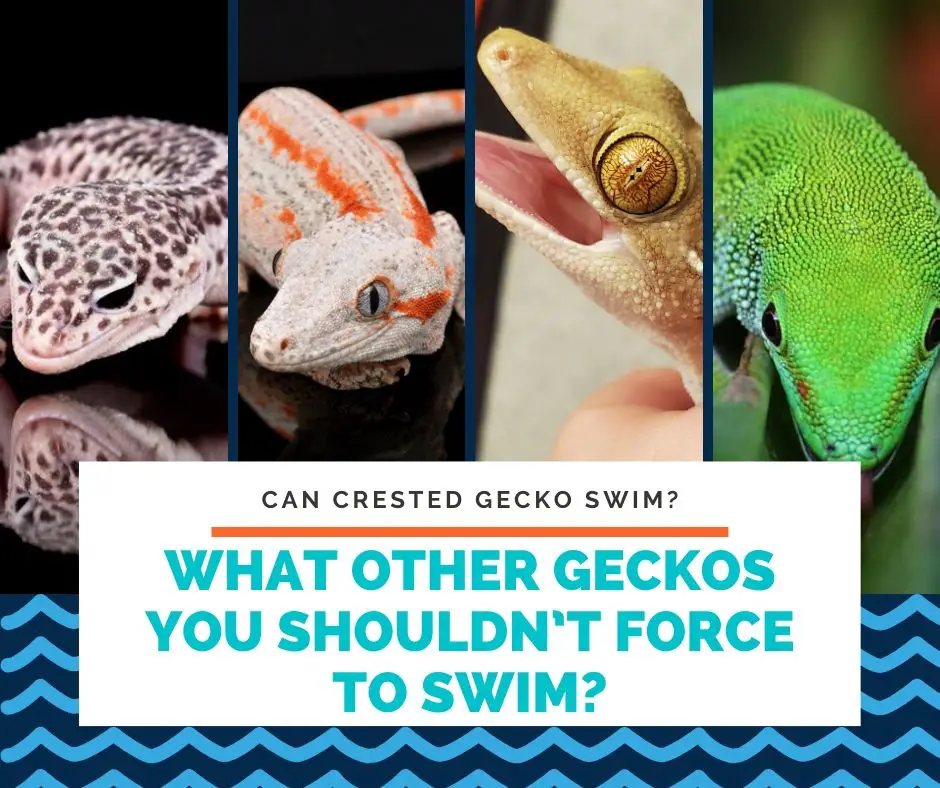
Leopard Geckos
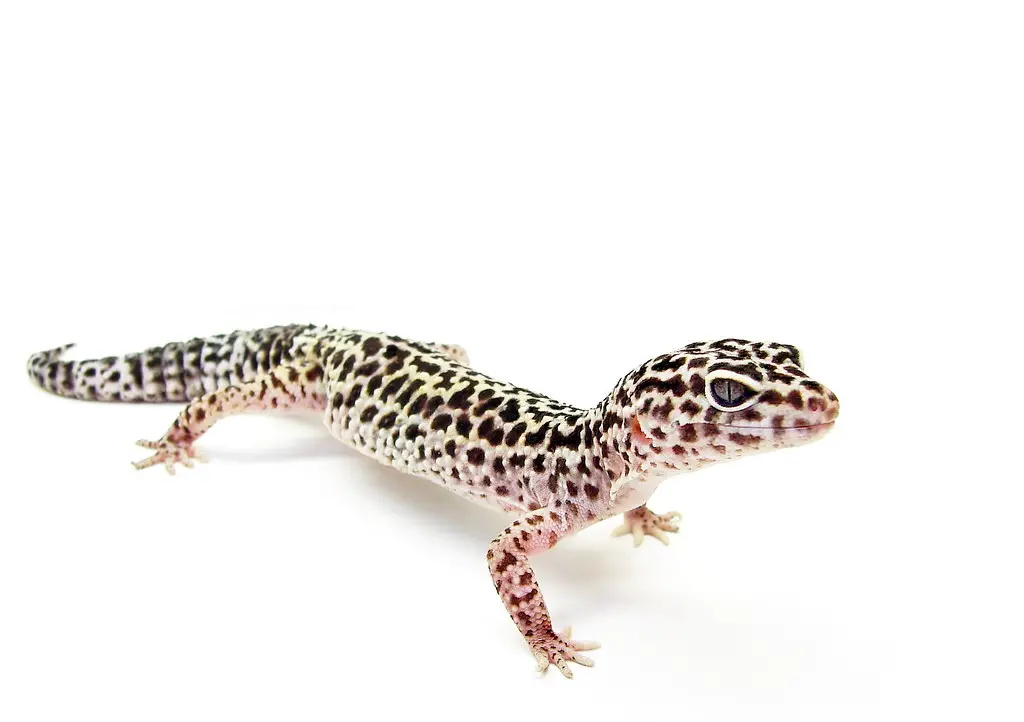
Leopard geckos cannot swim, but they float in the water. However, even floating is a bad experience that causes them stress.
It might seem like a good idea to watch your leopard swim in the water. But, as a responsible pet keeper, you should never intentionally put them in that situation.
Apart from causing stress, leopard geckos are at a high risk of drowning if you place them in a pool of water.
However, when they are shedding, sometimes they soak themselves in water to make the shedding process quick.
But, they do not stay in the water. So, instead of putting it in a dish of water, it would be better to spray it with some water to make it less stressful.
Madagascar Day Gecko
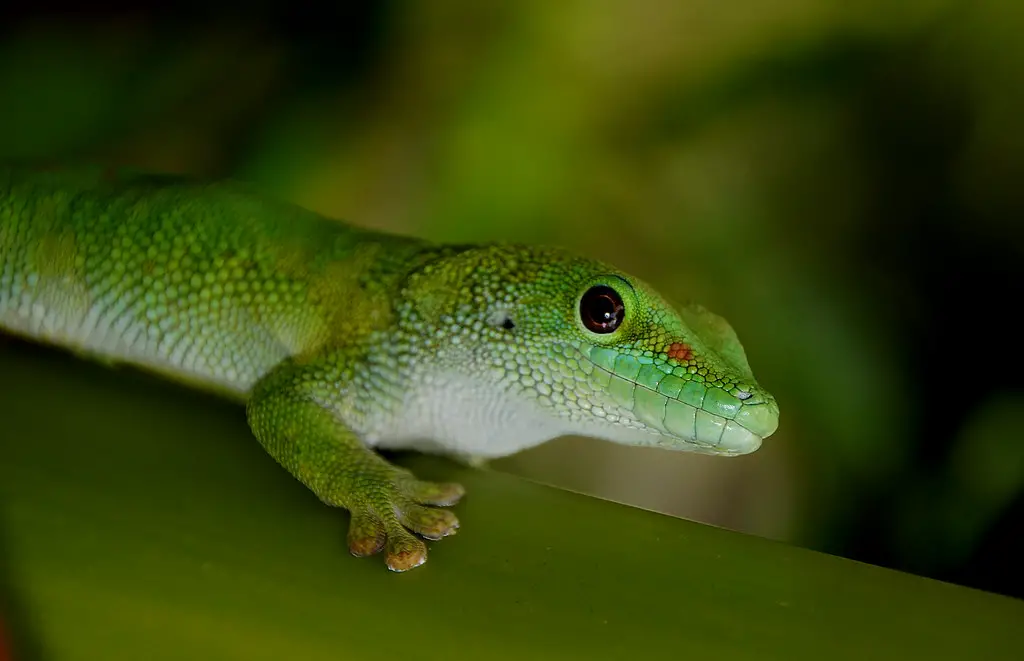
Just like crested geckos, Madagascar day gecko can swim instinctively. However, the experience is always traumatizing.
When Madagascar day gecko hits the water, they panic, and they usually have a hard time trying to maneuver through the water.
Therefore, again as a responsible pet owner, never should you ever try to force your Madagascar day gecko to swim.
You should not even include a water bowl for them in their cage. Instead, you should just ensure that you provide high levels of humidity in their tank.
The White-Lined Gecko
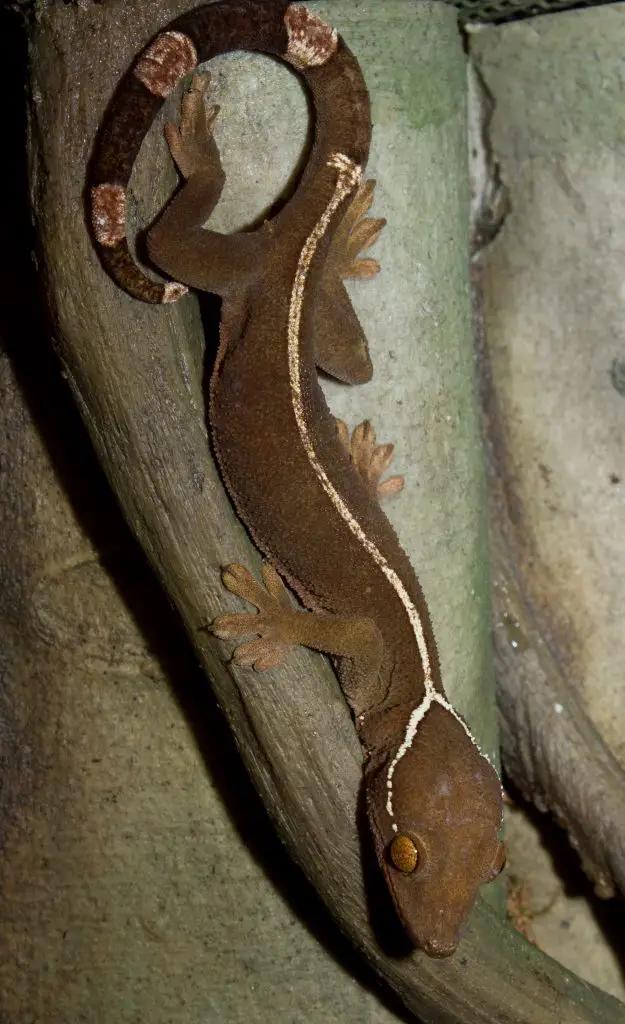
White-lined gecko is another common reptile pet. And, just like crested and Madagascar, it will never voluntarily try to swim.
However, if it finds itself in a pool of water, it will try to run through the water to save its life.
Therefore, you should never try to force or teach your white lined gecko to swim. Additionally, rather than including drinking water in a bowl, you should ensure that the humidity level in its tank is 65-75%. Crested geckos prefer to drink water from the mist droplets rather than from a bowl.
The Frog Eyed Gecko
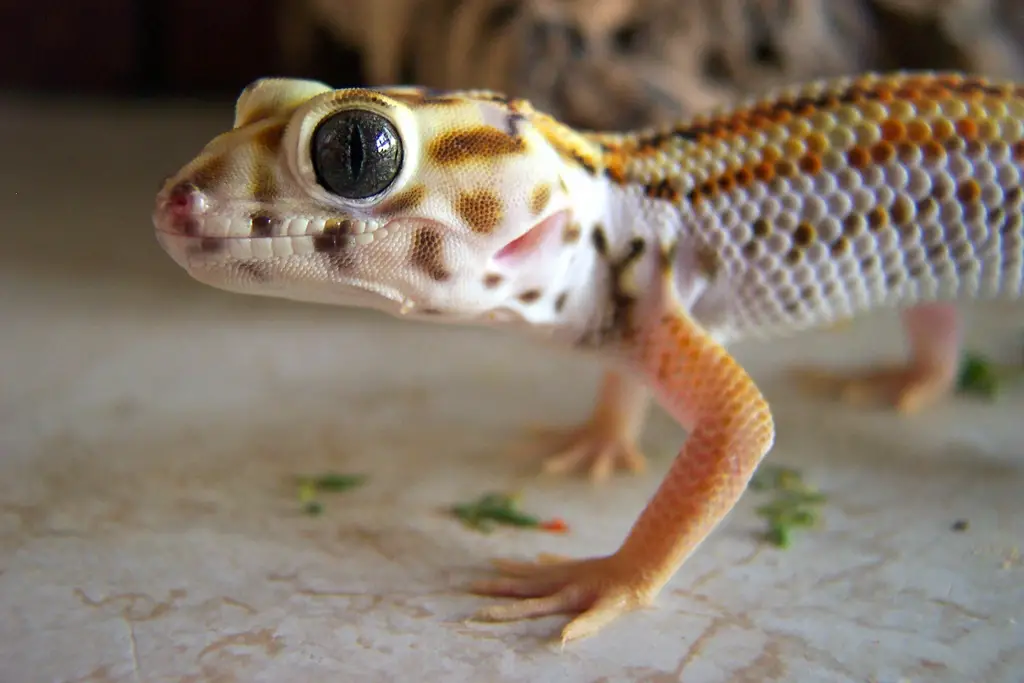
(Source: Flickr)
Similar to other geckos, frog eyed geckos do not need you to force them to swim. However, you can include a small bowl of water in their tanks.
New to crested gecko? Check out the crested gecko care sheet now! We had listed out all the things you need to know about crested gecko as pets. Check it now!
Even though you might never see them drink from the pot, they do. Again, during shedding, crested geckos soak themselves in the water bowl to ease the process.
But besides the shedding process, they do not require you to put them in a pool to swim. Crested geckos can also sometimes soak themselves in the water if the temperature is too high to cool off.
Thus, you should set the water bowl on the cool end. That way, the water won’t evaporate too quickly and because it’s evident for the gecko to go to the cool end when it’s hot.
Gargoyle Geckos
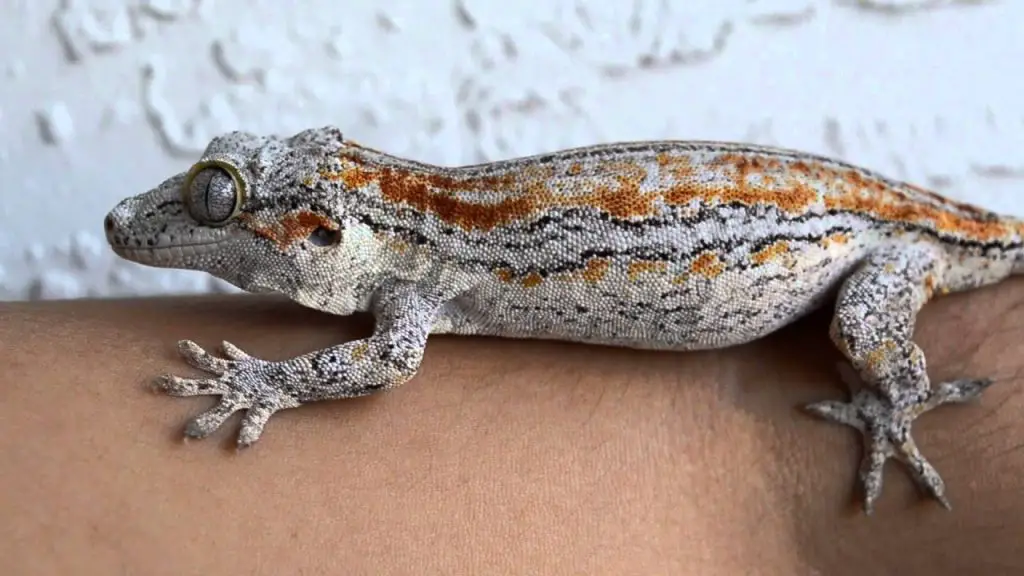
(Source: TikisGeckos YouTube)
Gargoyle geckos are also domestically bred reptiles. They are also not aquatic reptiles, so you should never assume they need you to force them to swim.
During the shedding period, you can give them a bath to make shedding easier. However, putting them in water should never be done regularly. It is, therefore, inappropriate for you to make them swim.
All of the geckos mentioned above do not like to swim. Some can even drown rather than swim their way to a safe spot.
Therefore, if you plan to own any of the geckos, you should consider another way to keep them entertained rather than make them swim.
Tips for Bathing a Crested Gecko
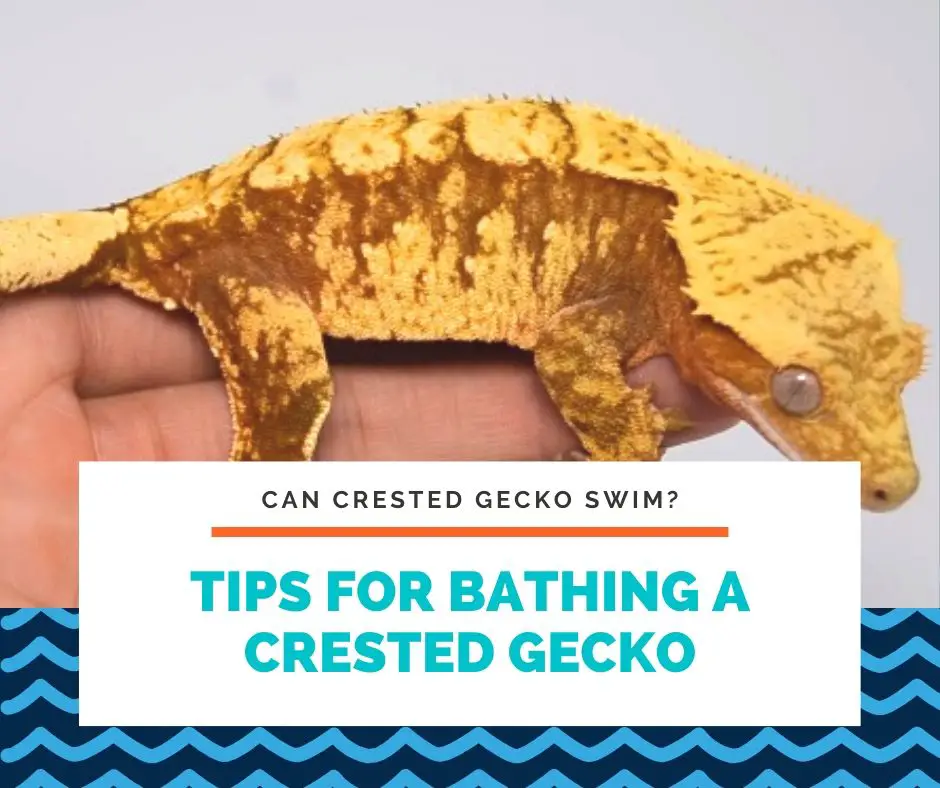
Before you start preparing a full container of water and soap, you should know that you do not need to bathe your crested gecko typically.
While failing to bathe your crested gecko doesn’t hurt, bathing it can. Therefore, it is better if you wouldn’t bathe your crested gecko.
Since crested geckos are bound to shed every two weeks for babies and once every month for adults, you don’t have to bathe them.
However, you can offer your crested gecko a good sauna to:
To Enhance the Shedding Process
Sometimes the shedding process can go wrong for crested geckos. It can be a result of dehydration or improper diet.
In this instance, you can give your crested gecko a sauna bath to make the shedding complete. Improper shedding can cause your crested gecko to lose the tip of their tail, toes, or even the entire foot.
To Cool Off Their Body
The ideal temperature for crested geckos is 780F. It can be harmful to crested geckos if the temperature would go above that.
However, if it happens and your crested gecko experiences overheating, you must soak it or give it a sauna bath to help it cool down. Overheating for crested geckos can cause heat stroke.
To Remove Food Debris, And Restore Stickiness
Remember that either a typical or sauna bath is never fun for crested geckos. However, sometimes food gets stuck on the toes, making it difficult for you to remove them.
In those instances, it is okay for you to offer your crested gecko a sauna bath to remove the debris. Also, it is necessary to regain their toes and tails stickiness.
Now that we have looked at why your crested gecko might need a bath let’s now look at the tips of giving them a sauna bath.
Get a Container
You will need a container that is rectangular shaped and has a lid with holes.
Take Lukewarm Water
Remember that the water should not be hot or cold.
Place kitchen paper towel or tissue at the bottom of the container
Use a hand spray pump to spray the warm water on the tissue until it is a dump.
Put your crested gecko into the container.
If you are bathing more than one gecko, you should ensure that you bathe one at a time.
Spray the mist on top of the lid, and then close the lid. Leave the gecko to stay for 15-20 minutes, but keep observing the gecko.
Open the lid and gently remove the gecko from the container. If the gecko still has stuck skink on its toes and tails, gently rub the skin with a Q-tip.
Note: The water that feels warm for you might be too hot for your crested gecko. Thus, it is wise to use a thermometer to measure the water’s temperature. The ideal temperature should not be beyond 850F.
